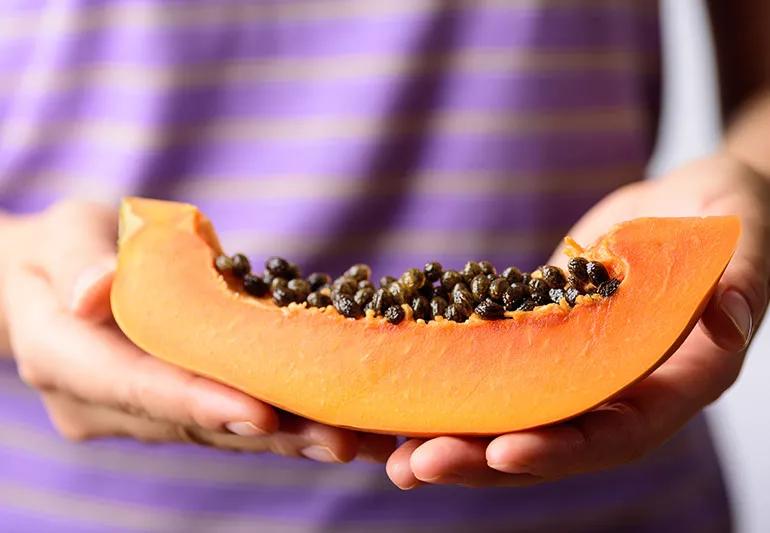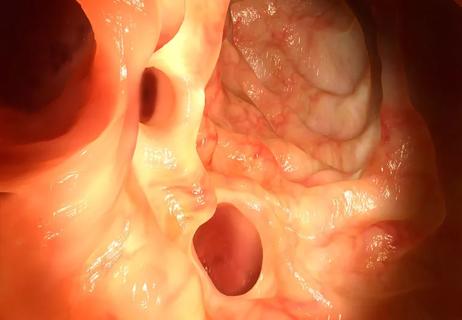TikTok trend encourages eating papaya seeds to ‘deworm’

Nobody wants bugs in their butt. Consider that an explanation behind one of the latest trends — eating papaya seeds to eliminate stomach worms — wiggling around on TikTok.
Advertisement
Cleveland Clinic is a non-profit academic medical center. Advertising on our site helps support our mission. We do not endorse non-Cleveland Clinic products or services. Policy
People are gobbling down the bitter fruit seeds in hopes of flushing unknown parasites out of their internal plumbing. Millions of videos posted on the social media channel share stories of… well, creepy-crawly worms evicted during the process.
So are papaya seeds the key to a parasite-free gut? And, realistically, how many people truly should worry about roundworms and other organisms inching through their intestinal tract?
We know what TikTokers say, but let’s check with a more reputable source — gastroenterologist Christine Lee, MD.
There’s a gross truth powering the TikTok trend: Roundworms such as toxocariasis, pinworms and ascariasis can take up residence in your intestines. The lifespan of these invaders ranges from weeks (pinworms) to up to two years (ascariasis).
Intestinal parasite infections affect tens of millions of people in the United States. Children are regular hosts given their sometimes less-than-stellar hygiene. They’re also seen in and spread by household pets such as dogs and cats.
Infections are more common for people living or spending time in impoverished areas or warmer climates. The parasites also can spread easily in institutional settings (such as schools or day cares) or when sewer and sanitation centers are compromised (broken water mains, hurricanes, power outages, etc.).
Advertisement
Roundworms typically enter your body through hand-to-mouth transfer. Infection can happen by touching soil or pet poop laden with roundworm eggs and then not washing your hands. (Again, a gross truth.)
The worms also could enter your system if you eat contaminated produce or undercooked meat (particularly pork) or drink untreated water.
Now the good news: Despite all of the above, intestinal parasites remain relatively uncommon in the United States. “They’re not unheard of,” says Dr. Lee, “but it’s not something that should be a regular concern for most people under normal circumstances.”
The selection of papaya seeds as a natural cure for parasites didn’t just appear out of nowhere. There is some evidence that suggests the fruit could serve as a treatment tool against these body invaders.
A study published in 2007 is often highlighted to support the papaya seed theory. The study focused on 60 Nigerian children with evidence of intestinal parasites. Researchers reported that 71% of children who received papaya seeds as treatment cleared their stool of parasites.
Another study from 2014 identified papaya seeds as a potential alternative solution to eliminating parasites in goats. (That’s beneficial for goat farmers but not exactly an endorsement for at-home treatment for people.)
“These are small studies and should not be extrapolated to general use without quality randomized, controlled, prospective trials with larger sample sizes,” says Dr. Lee. “We need to know if papaya seeds really work and if they are safe for human use.”
There’s an additional concern about papaya seeds, too. Trace amounts of cyanide — a harmful natural chemical — exist on the seeds, says Dr. Lee. Given that, ingesting them in large quantities could be harmful to your health.
If you think you’re among the unlucky ones with an unwanted intestinal guest, Dr. Lee offers this advice: Sign off from TikTok for a few minutes and schedule an appointment with your healthcare provider.
Symptoms of a parasite could include live worms being visible in your poop. (The gross truth continues.) Other symptoms include:
“These are classic alarm symptoms,” says Dr. Lee. “If in doubt, have it checked out.”
Treatment for hookworm usually includes a doctor’s prescription for a medication such as albendazole, mebendazole or pyrantel pamoate.
Dr. Lee emphasizes that papaya seeds or supplements touting deworming powers should not be relied upon as a primary form of treatment. “There is not adequate scientific evidence at this time to declare if this is effective or safe for human consumption,” she says.
Advertisement
There’s an additional risk to assuming worms are behind stomach woes, per TikTok medical guidance: You may delay the diagnosis of the real culprit behind your symptoms, notes Dr. Lee.
Frequent diarrhea or a consistently rumbly tummy could be signs of numerous GI issues, including:
“With such a long and wide-ranging list of possibilities, getting the right diagnosis is very important to getting better,” says Dr. Lee.
Advertisement

Sign up for our Health Essentials emails for expert guidance on nutrition, fitness, sleep, skin care and more.
Learn more about our editorial process.
Advertisement

It’s not an enema or bowel prep, and this colonic hydrotherapy can harm proper colon function

Reducing inflammation is key when you’re in a flare-up, but so is having a preventive nutritional plan in place when you’re not

Some symptoms you can treat at home, but others require a visit to the doctor

The short answer from a colorectal surgeon

Gallstones can block bile in your biliary system and lead to pain and discomfort

People with PKU need to avoid high-protein foods, like meat, dairy, legumes and whole grains

The caffeine and natural acids in coffee may trigger acid reflux, but there are ways to lessen the effects

Olive oil is high in heart-friendly unsaturated fats

Even small moments of time outdoors can help reduce stress, boost mood and restore a sense of calm

A correct prescription helps your eyes see clearly — but as natural changes occur, you may need stronger or different eyeglasses

Both are medical emergencies, but they are very distinct events with different causes